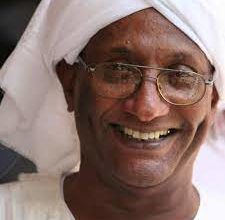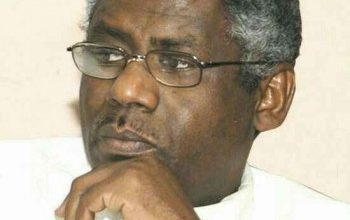We Beg You Not to Give the Revolution an Immoral Criterion: But You Did!!

Abdalla Ali Ibrahim
I was waiting for Salah Manaa and the majority of the members of the Committee for Dismantling the June 1989 Regime, to write something about the revolution setting a precedent of intuitional accountability for political, constitutional and public service individual, to be a precedent that we never had before. And I urged them that they should make sure the resolutions adopted by their committee shouldn’t be eternal and long lasting. This c committee has spurred some many an incident that the counter-revolutionary elements have made use of these incidents in their narrative about the committee, these narratives, thanks to the foolishness of the committee, have become its only known deeds. Furthermore, and in practical application for my call, I continued writings to some of them which I had wanted to clarify the suspicious elements that surrounded the work of the committee, but to my surprise, the said persons of the committee started ignoring my writings and calls, to the extent that some hang up on me when I phone call them. But I was expecting from Salah Mannaa whose reputation was whipped by the counter revolutionary torrents, as he indulged in writing, then let him give his testimonies which might snatch back some of the legacy of the revolution from the jaws of the counter-revolutionaries. But he disappointed me. Some of his tweets stunned me by their naivety when he started, instead, talking about Al Burhan and what more about Al Burhan!!
Imam Al-Sadiq once said to the predecessors of Freedom and Change, who criticized him with (many) valid and invalid criticisms, that they “were looking for a lost government of theirs” at the end of the sorry transitional government, which came following the April 1985 revolution. The things that are being emitted by FFC or Taggadum today are what can be said to be the feelings of those who wasted a revolution and do not want to bear their share of responsibility in its loss. They lost it in a dark place, as the saying goes, but they keep searching for it under the lamp of the Islamists or Al Burhan. And I find them scowling their cheeks without subjecting themselves to the criticism of the blaming soul. They are in the belief that they are innocent of any responsibility for what we have ended up with today. Even when they held workshops to evaluate the experience of the transitional government’s performance, they patted each other’s shoulders and dispersed.
Below you will find a letter from me to the members of the Appeals Committee of the Committee for Dismantling the Salvation Regime, asking them to fill the loophole in the appeal of the decisions of the Empowerment Committee in its performance, for quest of a premium.
To Lieutenant General Ibrahim Jaber, Chairman of the Appeals Committee of the Dismantling Empowerment Committee of the regime of June 89
To Maulana Nicholas Abdel Masih, Vice Chairman of the Committee
To Engineer Siddiq Youssef, member of the committee
And to the third FFC-affiliate, whose name I could not remember now, Committee member
Statements of solidarity with the committee to dismantle the June 1989 regime are frequent. The Professionals Association previously issued a statement supporting the committee. Solidarity continued recently in the decisions of the recent Council of Ministers and the political declaration of the FFC forces. Not to mention the inclusion of the committee’s functions in dismantling as a government doctrine within the Prime Minister’s recent policies known as the “Initiative” which the Prime Minister formed a committee to implement.
It seemed to me that solidarity with the committee was easier than this “warm up and warming up” in the sense of warming up to run for a difficult matter all at once. The most difficult thing the committee faces today is that its back is exposed, as its back is exposed following the evaporation of appeal mechanisms from above its sky. It remained alone in the field of dismantling empowerment, receiving unlimited whipping from the enemy and the sympathizers at once. The counter-revolutionaries were pleased by the absence of appeal, so that the grievances brought before the committee became material for incitement from the lowest levels of the type: call for support from the village, but don’t forget to hit the drum with thine stick. They made it a symbol of shameless corruption that, of course, exceeded the alleged salvation corruption, in their view. Those who benefited from the absence of appeal mechanisms wished that it would not exist because it would be at their expense if the Empowerment Committee confirmed its decisions. On the side of the revolution, many people were embarrassed by some of the committee’s decisions, and their knowledge about it emanating from the density of counter-revolution literature.
So they entered into embarrassing situation. They signed by virtue of the matter on the claim that returns the entire matter to the Corruption Commission. Rather, many of them believed that the judiciary is the first to handle the situation from A to Z. Mr. Nice people came out, they are the ones who discovered, intimidated by the loud voice of the counter-revolution, “didn’t you call for peace, freedom, justice,”. Democracy is a toothless system even though, as one of them said, it does not exist among the laggards (democracy is not for the timid).
Unfortunately, the appeal evaporated, largely due to the making of FFC and its transitional government. Two members of the committee resigned, including Siddiq Youssef, at a time the committee has not yet begun its work (we later learned of the resignation of the Minister of Justice himself from one of its positions). We do not know to this day whether FFC questioned the two of them or not, found out what was wrong with them, and presented it to public opinion after replacing them.
Occupying a revolutionary position is a trust and leaving it for partisan considerations is a shameful deficiency. On the other hand, no one knows what is going on in the corridors of the judiciary in terms of the establishment of the judicial department, which is above the Appeals Committee. FFC and the representatives of the Sovereignty Council in the Appeals Committee, Lieutenant General Ibrahim Jaber and Maulana Abdul Masih, tuned a deaf ear and a blind eye, also remained silent and fled from lion den. FFC and its government have not touched on this issue, this shameful absence of two symbols of power, while the documents of the cases of the appellants were filling the horizon. I wished that FFC had questioned Maulana Abd al-Massih, who came to her position as one of the choicest, delighted with something different in gender and religion
The defect in the appellants has reached such an extent that their grievances are received by a committee that it was not able to hold even one such single meeting during its not-so-short life to refer these complaints to FFC for comment. This is a strangely nice way for getting rid of a matter, indeed.
We do not want this final defense and bold protection, in solidarity with the dismantling committee, to apply to the joke of the waiter who said to the customer: “It seems you don’t intend to pay,” when the customer repeated more than once many a “thank you” for every service provided o him by the waiter. It would be an abhorrent negligence on the part of FFC and its government if its “thank you” were expressed as a way of intending not to assist the committee, which is suffering in the performance of its duty through faults not of its own, as to completing the appeal cycles.
What tears me apart is that Ambassador Khaled Moussa’s appeal remains without somebody to look at it for nearly a year. I do not want to personalize the matter, as for me, he is a first-class Sudanese writer, whether you want him within the diplomacy or not. I wrote the introduction of his book, “A Biography of a Transatlantic Journey,” which is not something written by someone who needs a lift or reinforcement. Of course, I have not seen his dossier, and I am not in a position to judge his professional career, but if I do my research, I doubt that he occupied any position in the Foreign Ministry, from his first appointment until he became ambassador, without the merits of his own personality and capacity, the work of his muscles.
At the end of my introduction to him, I wrote:
“This is an agreeable book. It is offensive, as though should be, without ferocity. It is defensive, as though should be, without bravado. Khaled reduced his erudition and consideration of the issues he dealt with in a way that did not resort to ferocity or bravado. His sentences are short, poetic, and easy. He strengthens himself with the Arabic preamble without difficulty: “He protected himself from this opaqueness,” “He extracted the soot and quenched the burning exhalation,” “And the sweet nectar of rhyme emerges from between the blood of meaning and the dung of inspiration.” So, just look this, loot at it!!
Tell him “show your back,” but not before reviewing his appeal, otherwise you will lose the beauty of political change, otherwise you would pat with the beauty of political described as determination combined with gentleness. This is what we hope that after the good news of the FFC, the government and professionals have committed themselves to, that they will perfect the principles of dismantling the salvation government-state. Please do not give the Revolution an immoral Criterion


